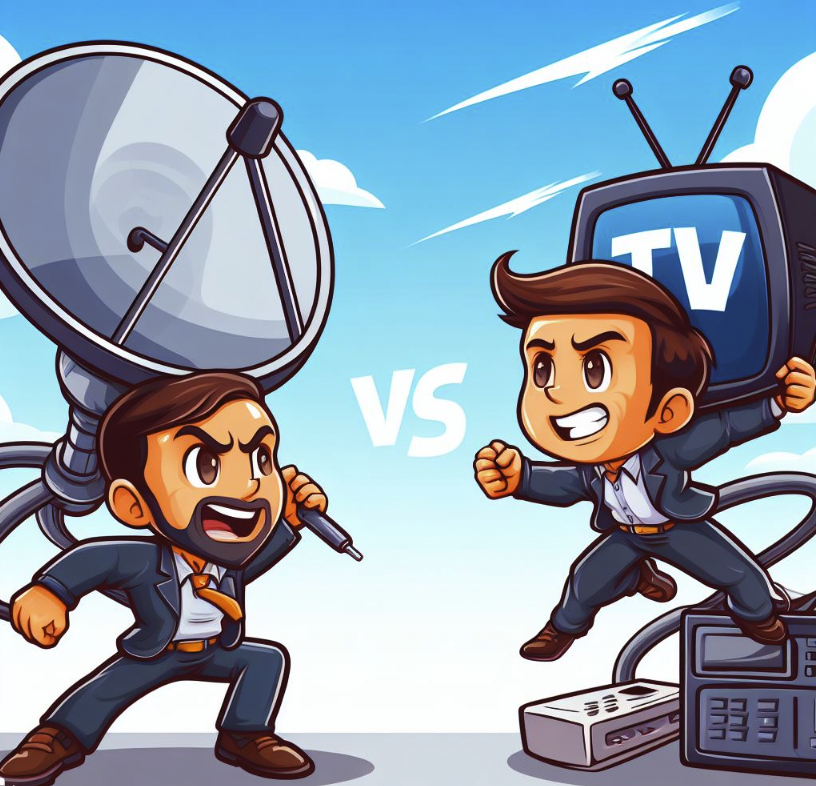When it comes to choosing a television service provider, consumers are often faced with the decision between satellite TV and cable TV.
Both options offer a wide range of channels, but which one truly offers more?
Satellite TV vs. Cable TV
The number of channels offered by Satellite TV and Cable TV can depend significantly on the specific service providers and the region or country in which they operate.
However, here are some general observations:
Satellite TV
- Channel Count: Often offers a higher total number of channels compared to cable TV.
- International and Niche Channels: May provide a wider array of international and niche channels.
- Packages: Typically offers various packages with different channel lineups to cater to various interests.
- Accessibility: Available in many areas where cable TV might not be, potentially offering more channels to users in remote locations.
Cable TV
- Local Channels: Often provides a robust selection of local channels.
- Basic Packages: Basic packages might offer fewer channels than satellite but at a potentially lower cost.
- Bundling: Cable providers often bundle TV, internet, and phone services, which might affect the perceived value and channel offerings.
- Stability: Less susceptible to weather-related disruptions, ensuring consistent channel availability.
Satellite TV might generally offer more channels and a wider selection, especially for international and niche audiences.
Cable TV might offer sufficient channels with the added stability and bundling options.
Always check with specific providers for accurate and detailed offerings in your area.
Below we look deeper into satellite TV and cable TV, comparing the number of channels they provide, exploring their differences, and helping you make an informed decision.
Table of Contents
The Battle of Channels: Satellite TV vs. Cable TV
Television has come a long way since its inception, and today, viewers have access to an extensive selection of channels catering to various interests and preferences.
Satellite TV and cable TV providers play a significant role in delivering these channels to our screens. Let’s take a closer look at each option:
Satellite TV
Satellite TV is a service that delivers television programming via communication satellites.
It involves the transmission of signals from a satellite dish installed on your property to a satellite in space, which then beams the signals back to a dish at the broadcast center.
From there, the signals are distributed to your television through a set-top box.
One of the key advantages of satellite TV is its ability to reach remote areas where cable infrastructure may not be available.
This makes it a popular choice for rural communities.
Additionally, satellite TV providers often offer a wide range of channels, including local, national, and international options.
Cable TV
Cable TV, on the other hand, relies on a network of cables to transmit television signals.
These cables are typically made of coaxial or fiber-optic material and are connected to a central hub.
From there, the signals are distributed to individual homes through a network of underground or overhead cables.
Cable TV has been around for decades and has established a strong presence in urban areas.
It offers a broad selection of channels, including local networks, premium channels, and specialty channels.
Cable providers often bundle their TV services with internet and phone services, providing customers with a convenient all-in-one solution.
Comparing the Number of Channels
Now that we have a basic understanding of satellite TV and cable TV, let’s compare the number of channels offered by each option.
It’s important to note that the number of channels can vary depending on the provider, package, and location. However, we can still make general comparisons based on industry trends.
Satellite TV Channels
Satellite TV providers are known for offering a vast array of channels, catering to diverse interests.
On average, satellite TV packages can provide anywhere from 100 to 300+ channels.
These channels cover a wide range of genres, including news, sports, movies, documentaries, lifestyle, and more.
For example, DirecTV, one of the leading satellite TV providers in the United States, offers packages with up to 330+ channels.
These packages include popular networks like HBO, ESPN, CNN, and Discovery Channel, ensuring there is something for everyone.
Cable TV Channels
Cable TV providers also offer a substantial number of channels to their customers. On average, cable TV packages can provide anywhere from 100 to 200+ channels.
These channels encompass a variety of genres, ensuring viewers have access to their favorite shows and content.
For instance, Comcast Xfinity, one of the largest cable TV providers in the United States, offers packages with up to 260+ channels.
These packages include popular networks like ABC, NBC, CBS, and Fox, as well as premium channels like HBO and Showtime.
The Differences Between Satellite TV and Cable TV
While both satellite TV and cable TV offer a wide range of channels, there are some notable differences between the two options.
Let’s explore these differences to help you make an informed decision:
Availability
Satellite TV has an advantage when it comes to availability. Since it relies on satellite signals, it can reach remote areas where cable infrastructure may not be present.
This makes satellite TV a popular choice for rural communities.
On the other hand, cable TV is more prevalent in urban areas where cable networks have been established for years.
Signal Quality
When it comes to signal quality, both satellite TV and cable TV offer high-definition (HD) channels.
However, satellite TV may be more susceptible to signal disruptions during severe weather conditions like heavy rain or snow. Cable TV, being a wired connection, is generally more reliable in such situations.
Installation Process
The installation process for satellite TV and cable TV differs. Satellite TV requires the installation of a satellite dish on your property, which needs to be properly aligned with the satellite in space.
This installation process may require professional assistance. On the other hand, cable TV installation involves connecting your television to the existing cable network in your area, which is typically done by a technician.
Pricing
Pricing is an important factor to consider when choosing a television service provider. Satellite TV packages often come with a higher price tag compared to cable TV packages.
However, it’s worth noting that satellite TV providers may offer promotional deals and discounts to attract new customers.
FAQs – Satellite TV vs. Cable TV: Which Offers More Channels?
1. Can I get satellite TV in my area if I live in a remote location?
Yes, satellite TV is an excellent option for remote locations where cable infrastructure may not be available.
Since it relies on satellite signals, it can reach areas that are not covered by cable networks.
2. Is cable TV available in rural areas?
Cable TV is more prevalent in urban areas where cable networks have been established for years.
However, some cable providers may extend their services to rural areas depending on the demand and feasibility.
3. Are there any differences in channel offerings between satellite TV and cable TV?
The channel offerings can vary between satellite TV and cable TV providers.
While both options offer a wide range of channels, specific networks or premium channels may be exclusive to one or the other.
It’s essential to check with the providers to determine which channels are included in their packages.
4. Can I get local channels with satellite TV?
Yes, satellite TV providers often include local channels in their packages.
However, the availability of local channels may vary depending on your location and the provider.
5. Do satellite TV and cable TV offer international channels?
Both satellite TV and cable TV providers offer international channels.
These channels cater to various languages and cultures, providing viewers with a diverse range of content.
6. Which option is more reliable during severe weather conditions?
Cable TV, being a wired connection, is generally more reliable during severe weather conditions like heavy rain or snow. Satellite TV may experience signal disruptions during such weather events.
7. Can I install satellite TV myself?
While it is possible to install satellite TV yourself, it is recommended to seek professional assistance. Proper alignment of the satellite dish is crucial for optimal signal reception.
8. Is cable TV installation complicated?
Cable TV installation typically involves connecting your television to the existing cable network in your area.
A technician will handle the installation process, ensuring everything is properly set up.
9. Are satellite TV packages more expensive than cable TV packages?
Satellite TV packages often come with a higher price tag compared to cable TV packages.
However, it’s worth considering any promotional deals or discounts that satellite TV providers may offer.
10. Can I bundle internet and phone services with satellite TV?
Yes, many satellite TV providers offer bundled packages that include internet and phone services.
These bundles can provide convenience and potentially save you money compared to subscribing to each service separately.
11. Can I watch satellite TV or cable TV on multiple televisions?
Both satellite TV and cable TV providers offer options for watching on multiple televisions.
Additional set-top boxes or receivers may be required, depending on the provider and package.
12. Can I switch between satellite TV and cable TV easily?
Switching between satellite TV and cable TV may require some adjustments, such as installing the necessary equipment or connecting to a different network.
It’s advisable to contact the new service provider for guidance on the switching process.
13. Are there any additional fees or hidden costs associated with satellite TV or cable TV?
Both satellite TV and cable TV providers may have additional fees or hidden costs, such as equipment rental fees, installation fees, or early termination fees.
It’s important to review the terms and conditions of the service before making a decision.
14. Can I record shows with satellite TV and cable TV?
Both satellite TV and cable TV providers offer DVR (Digital Video Recorder) services, allowing you to record and store your favorite shows for later viewing.
The availability of DVR functionality may vary depending on the provider and package.
15. Can I access on-demand content with satellite TV and cable TV?
Both satellite TV and cable TV providers offer on-demand content, allowing you to access a library of movies, TV shows, and other programs.
The availability of on-demand content may vary depending on the provider and package.
Summary – Satellite TV vs. Cable TV: Which Offers More Channels?
Both satellite TV and cable TV offer a wide range of channels to cater to viewers’ diverse interests.
Satellite TV providers typically offer a larger number of channels, ranging from 100 to 300+, while cable TV providers offer around 100 to 200+ channels on average.
However, it’s important to consider other factors such as availability, signal quality, installation process, and pricing when making a decision.
Related


